Yumabeli Castro wakes up at 6 a.m. every morning to prep the ingredients and set up the pans and kitchen amenities needed to make tamales. The Mesoamerican dish made with nixtamalized cornmeal dough, also known as masa, is Castro’s main and only source of income. After she sends her three kids to school, she begins to cook.
The seven types of tamales she makes are ready before she picks up her kids from school. Soon after, Castro heads out to sell her tamales in Huntington Park from 5 to 9 p.m. “At first, I was unsure of selling my tamales to the public and becoming a street vendor, but when I started to get out there and heard that people liked my tamales and my seasoning, it motivated me,” Castro said. “I’m proud of my work.”
Castro began to sell Tamales in 2020 after her former job closed due to the pandemic. She began selling her tamales at her husband’s job. “At that time, a lot of restaurants were closed, and because of that, I began to have more clients,” Castro said.
But business and street vending have not always been easy for Rodriguez, especially in 2023. In September, Castro’s tamales were thrown away by the Huntington Park Police Department (HPPD) in the middle of her 5–9 p.m. shift on the east side of the city. “Clients were eating tamales, and I was attending to others that were buying. It was busy and suddenly, HPPD arrived and behind them, big trucks with trash cans arrived. In just seconds, four HPPD officers surrounded me,” Castro said. “I had no idea what was happening; it was intimidating, and all my customers and I were shocked and scared.”
Castro said she tried to talk to the HPPD officers and offered to leave the premises. “I told them, ‘OK, I’m leaving. There is no need to throw away my food. I can leave, but don’t throw away my tamales,’ but they did it,’” she said.
According to a Cal Matters report, there are approximately 50,000 street vendors in Los Angeles County, with 80% of them being women. Many of the vendors, like Castro, are also people of color, immigrants and seniors from low-income households. “When the city or police throw our things, they are not just tamales, food, or whatever people are selling; it’s all the effort and time that it takes to make the food and go out there and sell it every morning or every night. It’s our salaries, and it’s our lives,” Castro said.
When HPPD confiscated Rodriguez’s tamales, one of her clients comforted her and walked her home after seeing how distressed she was. “When I saw all my work being thrown away, I wanted to break down and cry, but out of embarrassment, I didn’t,” she said.
The average street vendor in LA makes $38,038, according to Comparably, a workplace and compensation monitoring employee review platform. This pay is 20% lower than the combined average salaries of other metropolitan regions like Boston, Dallas, or New York.
Decriminalizing Street Vending
It’s been five years since California legalized street vending under certain conditions. What was formerly known as the Safe Sidewalk Vending Act was signed into law by former CA Governor Jerry Brown in 2018. The law states that vendors must comply with a city’s laws when vending in that city, but if vendors are within an unincorporated area, they must follow the county’s laws. For street vendors, a permit from the Department of Public Health is also required.
At Public Counsel, a nonprofit public interest law firm dedicated to advancing civil rights and racial and economic justice, many of their recent clients have been Huntington Park vendors who claim to have been harassed and intimidated by HPPD. One of them is Rodriguez.
Other than being part of the LA Street Vendor campaign initiated in 2008 and continuing to educate vendors about their rights, Public Counsel assists vendors with legal assistance and consultations. “We help some of them answer questions about citations they’ve received, ways they can appeal or contest in any way, or get a reduction in the fine. We ultimately represent individual vendors,” Ritu Mahajan Estes, Directing Attorney of Public Counsel, said. “For many people, vending is what helps them survive. It’s their only source of livelihood. It’s how they provide for their families, how they pay rent and pay for food.”

LA Street Vendor Campaign and its community organization partners, including the Castro (Far right) and Sandoval (right) at the Huntington Park City Council. Photo courtesy of LSVC.
Although street vending has been decriminalized, Mahajan Estes believes some cities, like Huntington Park, are erecting major barriers to vending and over-regulating it, making it impossible for many low-income people to be able to sell their products. “A lot of cities now have vending ordinances and vending rules, and Huntington Park’s rules are so onerous,” she said.
Huntington Park’s street vending rules and regulations
Huntington Park ordinances for street vendors include obtaining a Sidewalk Vending Permit and a City of Huntington Park business license that must be renewed annually. To complete a Sidewalk Vending Permit, food vendors need to turn in a total of six documents, including a County of Los Angeles Health Department Cart Approval, a Business Tax Registration Certificate, and a California Department of Tax & Fee Administration (Seller’s Permit).
In addition to the documents, street vendors must also agree to turn in live-scan fingerprints of the business owner and each vendor employee identified in the permit application, vending operations information, including days and hours of operation map of the scheduled traveled route, trash receptacle information, and proof of a $2 million liability (minimum) insurance policy, among other things.
“For folks that are undocumented, they’re very scared to submit their fingerprints to anything because you don’t know where the results are going to go,” Mahajan Estes said. “For low-income vendors, purchasing a $2 million liability insurance policy is out of reach.“
Mahajan Estes believes the unwarranted criminal citations, impounded vehicles, and failure to provide essential information on how to reduce citation fees have made vendors afraid to continue their work and caused trauma.
Vendors afraid to go back to HP streets
Jovita Andrade Sandoval is one of the vendors afraid to go back to work after dealing with the HPPD. Sandoval is from Michoacan, Mexico and immigrated to the U.S. in 1995. She was originally a hotel and house cleaner in Oregon, but began selling bread and tamales in 2019 when she and her husband moved to LA and after her arthritis got worse.
In 2022, Sandoval took one year off from street vending. Her knee was hurting and her mobility was limited . In August, she returned to Huntington Park to sell her tamales after her husband was laid off from work. She returned to the 99 Cent Only store where she would originally sell her tamales.
“When I began selling tamales, I began outside of a Home Depot, but the store would call the police on me. Back then, they never gave us tickets; all they did was kick us out of the premises,” Sandoval said. “When I landed at the 99 cent store, the security told me that people sought food there, and with little time, I realized that that was true. The manager told me I was welcome to sell there, and they even let me have one of their store carts so I could put my things and make it easier to sell my tamales. That’s why I decided to return to that place to sell again. I had never had a problem with the police or anyone.”
But that would quickly change. In early September, three weeks after she returned to sell her tamales, she was threatened and given a citation by HPPD. As she was vending, a police car stopped in front of her. “Two cops got out of the first police patrol cars, and seconds later, a second police car came. I was surrounded by four cops,” Sandoval said. “They said that if I did not go now and leave the premises, they would throw away my food. So I started picking up and one of my clients also helped me.”
Sandoval had been told this was a warning, but before walking away, one of the officers handed her a citation in English. ”She cannot read, so she didn’t really know what she was getting,” Mahajan Estes said.
“We go out early in the morning to work in an honorable manner, and they treat us like we have been robbing, like we are scamming people,” Sandoval said.
When she sought assistance from Public Counsel, Sandoval found out that she had actually received a citation for “panhandling,” a citation given to someone who is illegally accosting people in public to solicit donations.
“They lied. She wasn’t panhandling because she was selling food,” Mahajan Estes said. “We helped her get the citation dismissed through a lot of back and forth with the district attorney and different law enforcement agencies. Issuing criminal citations for vending is illegal.”
Sandoval has not returned to the 99 Cent Only store to sell tamales since then. “I’m scared. I do not want to go through that again. The officers told me that if I came back, the citation would be greater. I’m not sure how much it would cost, but I know that’s not something I can’t pay,” she said.
Today, twice a week, Sandoval walks the streets of Huntington Park and sells bread made by her husband. She takes a small cart and packs it in black bags so that, if seen by the police, they do not think she is a street vendor. “I try to hide it, so it is not too obvious, because I still need to work. I still need the money,” Sandoval said.
Public letter to the City of Huntington Park City Council
On November 7, the Los Angeles Street Vendor Campaign, made up of organizations such as Community Power Collective, East LA Community Corporation, Inclusive Action for the City and Public Counsel, presented a public letter to the City of Huntington Park City Council advocating for street vendors in that city.
“It has come to our attention that the City of Huntington Park is engaging in a concerning pattern of harassment and regulation of vending that is not permitted by California law. Multiple local vendors have reached out to LASVC seeking assistance with criminal citations they received for vending and the impounding of their vehicles,“ states the three-page letter.
In the letter, the LASVC requests that the city dismiss all pending criminal citations against local street vendors, instruct law enforcement to refrain from citing and harassing street vendors in violation of state law, and schedule a meeting with the LASVC by November 17 to discuss vending issues when it comes to city vending regulations.

Castro (left) talking to city leaders at Huntington Park.
“We hope we actually get a meeting with city leaders. If it doesn’t happen, then we’ll have to see what other action we can take against the city,” said Mahajan Estes. “Our goal is not to sue the city, but our goal is to really sit down with them and not only express what’s happening but also get them to understand how this is negatively impacting so many people and also change their vending rules.”
LASVC believes that restricting people from street vending not only deteriorates the city’s economy and cultural heritage but also contributes to the growing insecurities of people of color and social and economic issues they face. “Not being able to do their work as street vendors causes a lot of housing insecurity because many vendors are not sure if they’re going to be able to keep a roof over their heads,“ said Mahajan Estes.
“The way they are treated impacts their everyday lives. We have so many clients who are depressed and anxious. Vending doesn’t just help them pay the bills; it’s also a way for them to be social, to talk with people, to share their cultural values, and to make food that they remember from their home country.”
Food vending is both Castro’s and Sandoval’s source of income. Castro needs money not only to pay her rent but also to care for her family. Her 15-year-old daughter has autism, and both her parents, who are now in Mexico, are sick.
“My mother had a stroke, and she lost mobility in the bottom half of her body. My father, on the other hand, needs to have open heart surgery,” said Castro. “I’m a mother, spouse and daughter. Not letting us work is not only affecting me, but it’s affecting the lives of children and elders that are in my care.”

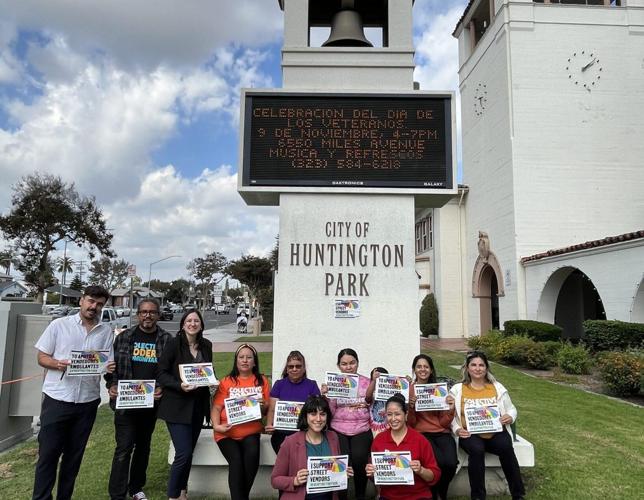
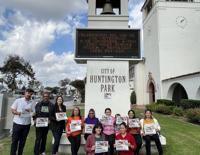
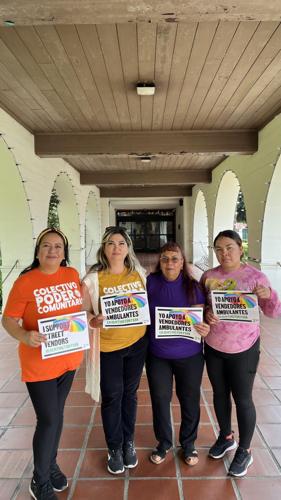

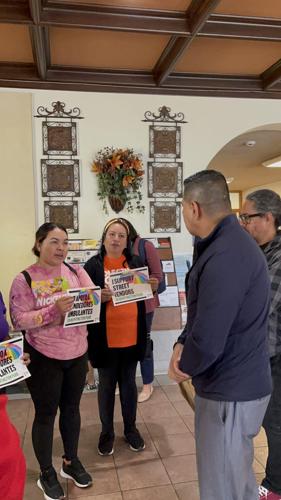
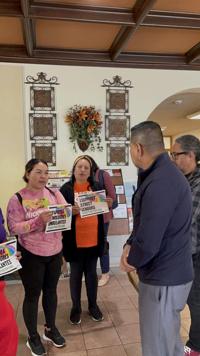
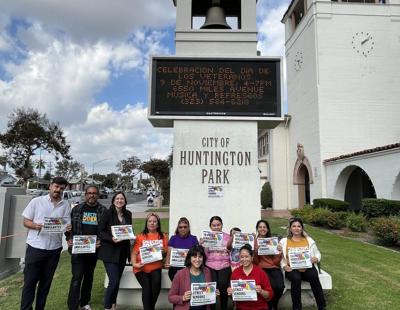








(0) comments
Welcome to the discussion.
Log In
Keep it Clean. Please avoid obscene, vulgar, lewd, racist or sexually-oriented language.
PLEASE TURN OFF YOUR CAPS LOCK.
Don't Threaten. Threats of harming another person will not be tolerated.
Be Truthful. Don't knowingly lie about anyone or anything.
Be Nice. No racism, sexism or any sort of -ism that is degrading to another person.
Be Proactive. Use the 'Report' link on each comment to let us know of abusive posts.
Share with Us. We'd love to hear eyewitness accounts, the history behind an article.